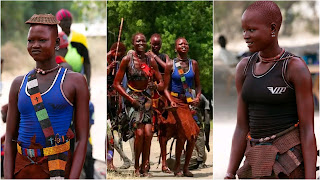The Mundari are a Nilotic ethnic group of about 70,000 to 100,000 people living in the Central Equatoria and Western Equatoria states of South Sudan. They are known for their unique culture and lifestyle, which is centered around their cattle.
The Mundari are agro-pastoralists, meaning that they combine agriculture with cattle herding. Their cattle are their most prized possessions and are used for food, milk, transportation, and wealth. The Mundari believe that their cattle are sacred and that they have a special relationship with them.
The Mundari are a patrilineal society, meaning that property and inheritance are passed down through the male line. Men are the heads of households and are responsible for making decisions about the family. Women are responsible for the day-to-day tasks of running the household, such as cooking, cleaning, and caring for children.
The Mundari are a peaceful people, but they have been known to engage in cattle raiding with other tribes. This is a traditional practice that is used to acquire more cattle.
The Mundari are facing a number of challenges, including poverty, conflict, and climate change. However, they are a resilient people and are determined to preserve their culture and way of life.
Here are some other interesting facts about the Mundari tribe:
They are known for their elaborate hairstyles, which are often decorated with beads and feathers.
Men are known to bathe their hair in cow urine, which is said to give it a yellow-orange color.
They practice ritual scarification as a rite of passage into adulthood for young men.
They are skilled archers and hunters.
They are known for their hospitality and welcome visitors with open arms.
The Mundari are a fascinating people with a rich culture and history. They are an important part of the South Sudanese community and their unique way of life is worth preserving.

